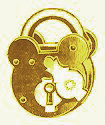K. W. "BOB" SIDBOTHAM AND BILL SIDBOTHAM
see entry under W.B.S. Locks Ltd.
JESSE SIMMONDS AND SONS, 93 NEW HALL STREET, WILLENHALL
Maker of all
types of locks. In existence in 1914 and 1953 but not in 1970. Nothing else
known.
G. H. SKIDMORE, 4 SALISBURY STREET, WOLVERHAMPTON
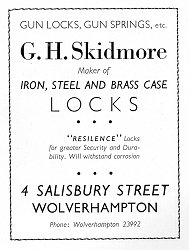 |
An entry in the Wolverhampton Official Handbook, 1953, says that Mr.
Skidmore started business in partnership in 1938, making gun locks and
springs. The partnership was dissolved in 1943 but Skidmore carried
on on his own. Since 1946 Skidmore had been making 1 in. signal
pistols. In May 1950 he acquired the business and goodwill of George
Hunt "an old established lock manufacturer of Wilenhall.
"More recently" he acquired a major interest in Resilience Lock
& Manufacturing Co. Ltd. At the time it was hoped to move both
of these firms to Salisbury Street. |
The advert (above) which accompanied this entry refers to gun locks, gun
springs, iron, steel and brass case locks; and gives the trade name
"Resilience", which presumably came from the Resilience Lock
company.
THOMAS SKIDMORE, STAFFORDSHIRE SAFE WORKS, STEWART STREET, WOLVERHAMPTON
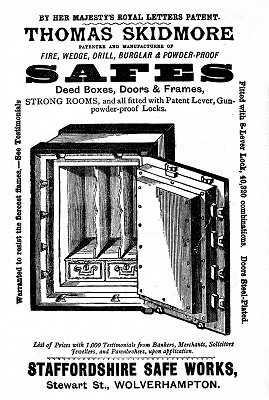 |
The company was originally named Skidmore and Langham,
the two partners being brothers in law.
This advert, from the catalogue of the Wolverhampton Arts and Industrial
Exhibition of 1884 seems to show a
well established company operating at the heavier end of the security market.
The advert mentions "Royal Letters Patent", which refers
to the patents the company held. But they were also "by
Royal Appointment", though when, to whom and for what is not
known.
The firm also supplied safes to Pearl Assurance.
|
| This plate from a safe in the Lock Museum claims that the company was
established in 1850. |
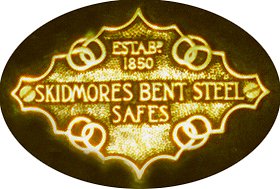 |
The company continued to make safes up until the 1920s when it was
decided that the new equipment needed to make bent steel safes was not
worth investing in. Thereafter the company continued to do repairs
and other work on their safes and to sell safes, with their name on them,
but they were all made by other firms: firstly, S.Withers of West
Bromwich, then Stephen Cox of Sedgley, then the Dudley Safe Co..
This continued until about 1990 when all work ceased.
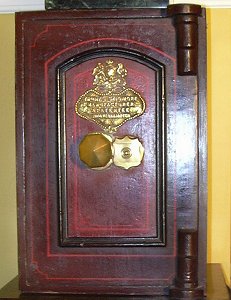 |
A small safe by Thomas Skidmore. Note the coat of
arms, denoting a Royal Warrant.
Photo courtesy of Steve Cannon. |
(Thanks to Dick Rhodes, sometime partner in the
Wolverhampton firm of Skidmore, Auctioneers and Estate Agents, which was
established by the same Skidmore family).
ABRAHAM SMITH, 71 ESSINGTON ROAD, NEW INVENTION
Key maker. Not in existence in 1921 or 1970. Existing in
1953.
Thomas Smith started the business in the Lichfield Road, New Invention, in the
houses by the Post Office.
Thomas' children were Abraham and Thomas, who joined him
in the business; Peter, Leonard, Dora and Florence.
Peter was a locksmith who became the manager of Bloxwich Lock and Stamping
Co.. He married Lavinia Smith (nee Whitehouse). They had seven
children of whom two, Reginald and Peter, worked at Bloxwich Lock and
Stamping.
Abraham Thomas married Caroline. Their children were William, Percy [Ivy and Leonard’s
father], Thomas,
Leonard, Dora, Irene and Carry. Ivy remembers that Caroline used to polish the keys on the kitchen table with a oily rage and then wrap them in brown
paper.
Abraham eventually took the business over when his father died. He
later moved to 72 Essington Road and built a wooden workshop behind the house.
This was next door to his sister Dora, whose husband, Mr Cook, ran a shop. They
were the parents of Bill Cook.
Thomas, who continued the business after his father died in 1941, joined Abraham.
Thomas continued with the business for some years,
while his wife, May, ran a drapery shop by the Gate Inn. During the war May use to
deliver keys on her bike to Bloxwich Lock and Stamping.
(Information from Ivy Ridgway 12/5/2000; and from
Paul K Smith, the grandson of Peter Smith, 26/04/2003)
ARTHUR E SMITH, 37 POWLETT STREET, WOLVERHAMPTON
Established in 1860 as makers of safe, cabinet deed box, pad and rim
locks. They also made brass furniture and fittings for the metal box and safe
trade. Existing in 1921 and 1953. Not in existence in 1970. Nothing else
known.
DAVID L. SMITH, 24 STRINGERS LANE, WILLENHALL
Key maker. Not in existence in 1921 or 1970. Existing in
1953. Nothing else known.
JAMES H SMITH, MERRIDALE STREET, WOLVERHAMPTON (1895-1976)
James H Smith[2] founded his lock making firm in 1896 (Stubbs
Directory 1970) at No 2 Merridale Street Wolverhampton, when he split from his
father's cabinet lock making company of Jeremiah Smith[1] who had works in Sweetman
Street, Wolverhampton. The two firms continued for three quarters of a century
making the same products in the same town and competing for the same customers.
By 1921 Jeremiah Smith and Sons Ltd are listed in Kelly’s Directory
as being at No 9 Newbridge Street, Whitmore Reans, Wolverhampton. James had premises
in Retreat Street. Both Jeremiah[1] and James[2] were Methodist local preachers in
the Wolverhampton area. The business was taken over by James son[3]. By 1953
the company were at No 2 Merridale Street West, manufacturing cabinet and brass ships
locks. The business then passed into the hand of his son David[4]. In 1973,
for sentimental reasons David purchased the goodwill of Jeremiah Smith and Sons Ltd from
Ernest Smith[2], who by this time had virtually finished making locks. In 1976 David
merged his business with Thomas Benton and Co. Ltd to form Benton Smith (Locks) Ltd. (Information
from David Smith)
JEREMIAH SMITH AND SON LTD, 9 NEWBRIDGE STREET, WOLVERHAMPTON
Brass cabinet lock makers. In 1880 (Kelly’s) Jeremiah Smith
had an address in Sweetman Street, Wolverhampton. By 1921(Kelly’s) he is listed
as being 9 Newbridge Street, Whitmore Reans, Wolverhampton. There is a possibility
that the works were always at Newbridge Street and that Jeremiah lived in Sweetman Street,
where he may have had an office. The firm specialised in the manufacture of brass
cabinet locks, they made their own brass casings and by the 1890s were employing over 100
people. In the 1920s the business was being run by Jeremiah William Jones (possibly
Jeremiah Smith's son in law) and Fred and Ernest Smith, Jeremiah's sons. They then
employed about 30 people. It remained in the family until 1973, when Ernest Smith,
who by that time had virtually finished making locks, sold the goodwill of the business to
David Smith of James H Smith .
A. V. J. (Tony) Whitehouse, a great grandson of Jeremiah William Jones,
remembers the works in the late 1920s and early 1930s.
Read the description
of the works |
 |
JOSEPH SMITH AND SONS, 7 GOUGH STREET, WILLENHALL
Key maker. In existence in 1913 and 1953, but not 1970. Nothing else
known.
SMITH, DERITEND BRIDGE WORKS, BIRMINGHAM
(Was this Smith Wallis?) Makers of heavy mortice locks.
Mrs Davis wrote to Maurice Hartland saying that her husband worked there and, when they
were married in 1930, his wages were £3-7-6 per week. The factory was very run down
and often rats kept the locksmiths company. When it was closed the business was
transferred to Marley Brothers and then sold to Tonks, who eventually amalgamated with
William Newman to form Newman Tonks.
In 1940 there was a Charles Smith and Co at Franchise Street Birmingham
22. Was there any connection?
In 1940 Tonks (Birmingham) Ltd, making coin-feed locks, were at 201
Moseley Road, Birmingham 12.
In 2001 Smith Wallis were members of the Basta Parsons Group
GEORGE SPENCER, ST ANN’S ROAD, WILLENHALL
In 1917 they were making rim and night latches at 51 Union
Street. They started to manufacture cylinder night latches, possibly under the APEX
& ALTUS brands.
In May 1931 the CLMA reported that J Waine and Sons, Brittania Works,
Lower Lichfield Street, Willenhall were selling a Brittannia latch. George Spencer
of Union Street, Willenhall, was making them for them. Both companies were invited
to join the association but declined.
By 1953 had moved to new premises in St Ann’s Road, Willenhall.
Not in existence in 1970. Nothing else known.
A & E SQUIRE, LITTLE LANE, SHORT HEATH,
WILLENHALL
Brass cabinet lock makers. The Squire family have been making
locks in Willenhall for over 300 years but it was not until March 1927 that A & E
Squire Ltd was originally founded as a partnership by two brothers, Alzo & Elroy
Squire.
They began part-time working in a brick outbuilding at the back of their
parent’s house at 1 Little Lane, Short Heath, Willenhall, Staffordshire. Like
many of their neighbours the brothers were outworkers, working in the early morning and in
the evening when they had finished working in the lock factories of Willenhall.
Elroy, who was the younger of the two brothers, worked at Hargrave &
Fox, Willenhall, where he became one of their best locksmiths. When he was 20 he
asked for a rise as befitted his ability. When this was not forthcoming Elroy decided to
leave and start his own business.
Whilst running his business, and being less than 21 years old, he was
unable by law to sign cheques in his own right. Therefore his father (Arthur Squire)
signed on his behalf. When Elroy became 21 he told his father he would sign himself
but Arthur insisted he would still sign. This continued until one day Charles Pinson
of Josiah Parkes asked Elroy: "Who’s the gaffer at your place? It's him who
signs the cheques is the gaffer?"
At this time Elroy asked Alzo to join him in the business. To this
end they obtained a mandate from the bank, which they signed, and in effect took complete
control of the business from their father. A short time later Arthur asked why he
hadn’t had any cheques to sign lately?
This was the beginning of A & E Squire.
At first Alzo continued to work as a foreman at Vaughan Bros in Willenhall
in order to bring in a steady wage until their business was on a firm footing. He
enjoyed going to sales where he purchased various items for tooling their workshop.
These he then donated as his contribution to the assets of the partnership.
Their father, Arthur, who was working as foreman in the lock shop at
Thomas Tuckleys, Willenhall, was dismissed when it became known that his sons had started
a business in opposition to them. Following this he was employed full time by A & E
Squire.
As time went on and space became at a premium, the brothers bought their
neighbours' workshops and covered yards to create more space for more machines and
employees. Eventually most of the surrounding houses and buildings in Little Lane
and Bloxwich Road North were acquired and bigger and newer shops were built.
In the early days, Alzo and Elroy’s mother Sarah, and their wives to
be, Barbara and Olive, helped to wrap the locks and pack them into boxes on a Friday
evening ready for Elroy to deliver to Willenhall on the back of his bike. Elroy
insisted on being paid in cash there and then, so that when he returned back to work he
would be able to pay the waiting employees their wages.
During the Second World War A & E Squire worked for the Government
making ammunition cases.
The business was incorporated as a limited company in 1960. They are
still on the same site today as we were in 1927 and the original workshop at the rear of
1, Little Lane is still in use as part of the finishing department. The house was
demolished many years ago and they no longer have an entrance in Little Lane.
Throughout the years many of the Squire family have worked in the family
business. As well as the parents and wives of the founders already mentioned, their
brother Lionel and sister Iris, children and grandchildren have all been employed at the
company.
Elroy’s son Derek, and Alzo’s son Keith, joined the firm in 1951
& 1953 and now the firm is managed by the third successive generation of the
family. Alzo died in 1974 and Elroy died in 1980, leaving Derek and Keith to
continue their good work. In more recent times Derek’s children have sustained
the tradition of joining the family business (Diane 1976, Martin 1977 and Craig
1986). Unfortunately the Managing Director Derek died in 1996. This left the
following members of the family running the business: Martin Squire - Sales Director;
Craig Squire - Financial Director; Keith Squire - Technical Director Diane Sims - Company
Secretary.
(Information from A & E Squire web site 31/1/2001)
HENRY SQUIRE AND SONS, NEW INVENTION, WILLENHALL
The firm was established in 1780 by William Squire, who
started to make locks in a building on the site of the present factory. The company
has been owned and run by his descendants ever since.
Thomas took over the firm in 1820 and in 1848 another
Squire, whose first name is not recorded, took over. Then came Henry (b1824 in
Willenhall) in 1870. It was he who gave the company the title of Henry Squire and
Sons. He was running the company in 1881 when he employed 12 men and 6 boys and it
was his son, also James, who took over in 1900.
The series of letterheads below gives some indication of the
company's activities in the 1920s.
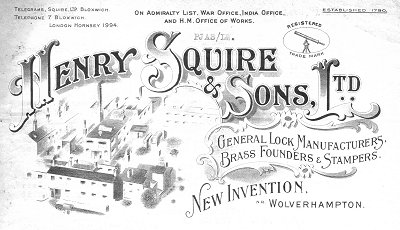 |
This letterhead is on a letter dated 1922. The company
describe themselves not only as general lock makers but also as
brass founders and stampers. |
| This heading is on a letter dated 1924. The view of the
works indicates that some building and rebuilding work has been
going on. |
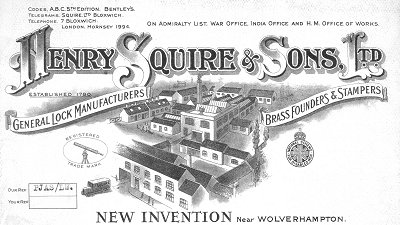
|
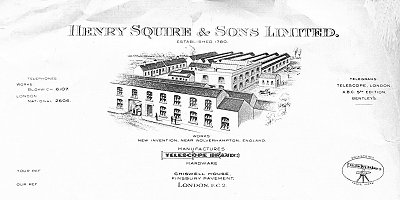
|
This letterhead is not dated but seems to
be somewhat later than the previous two. |
| The letterheads show the company's trade mark telescope. |
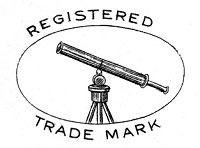
|
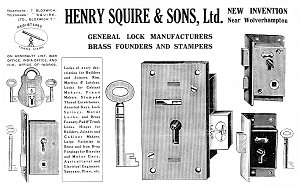 |
The advert (right) is from 1920.
It probably shows only a few of their total range of locks.
|
| The advert (left) is from a trade directory of 1924,
again probably showing a small part of the their range but also
showing hinges. |
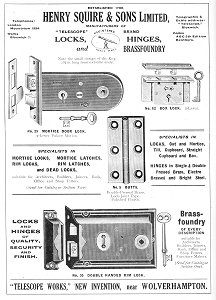
|
Percival Squire, the fifth descendent of William took over in 1940, and
recalls the days his father worked with a labour force of 12 in the old premises.
His son Gordon then took over the running of the company in 1960, with John Squire taking
over the managing director's role in 2002. (Express and Star 8/1/2002)
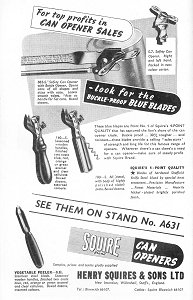 |
Two pages of adverts from the catalogue of the British
Industries Fair, 1950. The one on the right illustrates the
company's later specialisation in padlocks. The one on the
left shows the blue blades can opener and a vegetable peeler. |
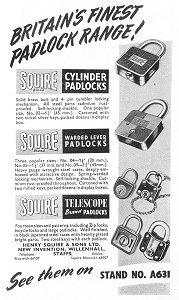
|
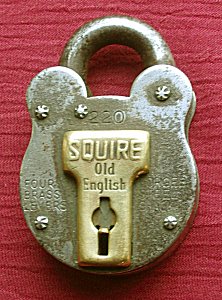 |
In October 1930, while under the control of James, the
company suffered a setback when the works were completely gutted by fire, resulting in
about 80 people being put out of work. The estimated damage was £18000. They
recovered from the fire and continued making a selection of locks, being particularly
strong in furniture locks, from the 19th. century until the 1930s. But competition
from Germany, the changes induced in furniture, induced a change in specification in
padlocks. The firm then developed into one of the leading manufactures of padlocks,
including accessories such as the patented Squire Clamp and Miniclamp range of hasps and
staples, and a range of locks designed for the cycle and motor cycle trade. |
| They also had
a range of kitchen tools, including the patented Blue Blade can opener. |

|
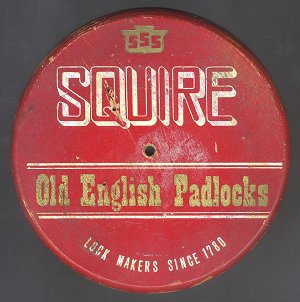 |
This item is made of wood, screen printed, and seems to date from about
the 1950s. It appears to be a point of sale item of some sort. |
| An advert from The Ironmonger Guide, 1950. |
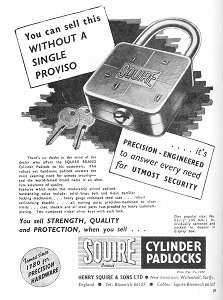
|
During the war production was switched to the manufacture
of precision gauge tools and submarine nuts.
In 1985 the company had a work force of 310 and exported to over 100
countries throughout the world. Times were getting difficult with cheap padlocks
being imported from the Far East so that by 1998 the workforce was down to 140. (Brian
Lavender 19/8/98)
In March 2005 it was reported in the Express and Star
that the company was proposing to sell off the site it had occupied since the
eighteenth century for housing. They are reported to have produced plans
for housing but not to have decided where to relocate, though they indicated
they were looking for premises in either Walsall or Wolverhampton.
 |
 |
| Return to Locks and Safes |
Return to the list of makers |
|
